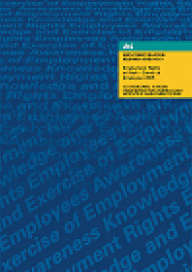Publications
 We author and publish a range of resources to keep you up to date with the latest developments in employment, labour market and human resource policy and practice.
We author and publish a range of resources to keep you up to date with the latest developments in employment, labour market and human resource policy and practice.
All our pdf publications are free to access.
-

Employment Rights at Work
Survey of Employees 2005
Casebourne J, Regan J, Neathey F, Tuohy S | Mar 2006 | Department of Trade and IndustryThe main aims of the study were: to assess employees' general awareness of the scope of their employment rights; for selected topics, to establish employees' knowledge of specific employment rights provision (eg level of the National Minimum Wage(NMW), qualifying period for taking action on the grounds of unfair dismissal and discrimination cases, and rules for the award of costs in employment tribunal cases); to find out the main sources of information and professional advice about employment rights issues and, when employees have had a recent problem (eg in the past five years), where they sought advice and guidance and what they did to try and resolve the problem; and to identify the personal and employment characteristics that influence employees' levels of awareness, knowledge and preparedness to seek advice and take action to enforce their individual employment rights (including employment status).
-

The Experience of Claimants in Race Discrimination Employment Tribunal Cases
Aston J, Hill D, Tackey N D | Mar 2006 | Department of Trade and IndustryThis qualitative study explored the perceptions and subjective experiences of claimants who were involved in Race Relations Act Employment Tribunal cases. In-depth interviews with 40 race discrimination claimants were carried out between May 2005 and February 2006. The report draws out emergent themes about: the progress of cases; advice, guidance and representation; expectations and motivations; and issues of power.
-
📄
Career Development of Knowledge Workers
Facing the Challenge
Hirsh W | Mar 2006 | Institute for Employment StudiesThis paper examines some of the issues involved in the effective career management of knowledge workers and specialists. We use the term 'knowledge workers' here for employees with professional or functional expertise necessary to delivery the products or services of the organisation, or to support the effective running of the organisation. We will often use the term 'specialist' to describe a person whose contribution to the business lies in doing high level professional or technical work themselves, rather than through managing other people who deliver this work. 'Specialists' in this sense are often at 'managerial levels' in the organisation but not in jobs which involve a lot of format management responsibilities.
-
📄
Carers in the Workplace
Hillage J, Hunt W | Mar 2006 | Institute for Employment StudiesAs the population ages and employers increasingly seek to offer competitive terms and conditions in order to attract and retain key staff, interest in employers' policies on the provision of time off for eldercare - and other forms of care besides childcare - appears to be growing. This briefing reviews recent research on, and practice recommendations for, the growth of the caring population, and the implications for employers.
-
📄
eRecruitment Developments
Barber L | Mar 2006 | Institute for Employment StudiesThis briefing paper for IES members weaves together a summary of what IES knows about e-recruitment (or online recruitment, Internet recruitment, web-based recruiting) based upon its own research together with collection of key literature and other published research.
-

The Labour Market for Graduates in Scotland
Bates P, Tyers C, Loukas G | Mar 2006 | Futureskills ScotlandThis report describes how the labour market in Scotland for graduates changed between 1993/95 and 2001/03, and examined what effect the large increase in the supply of graduates had on the labour market experience of graduates in Scotland. This publication is no longer available.
-

The Comparative Capability of UK Managers
Tamkin P, Mabey C, Beech D | Mar 2006 | Sector Skills Development AgencyThere has been much concern over the productivity of the UK economy which, despite being the fourth largest economy in the world, has seen productivity levels gradually fall behind competitor nations. In part this has focused on the degree to which UK management capability is lacking in some way. This view has been supported by studies which have shown that UK managers tend to be less qualified and receive less training than others in Europe and elsewhere.
-

Maximising the Role of Outreach in Client Engagement
Dewson S, Davis S, Casebourne J | Feb 2006 | Department for Work and PensionsThis report presents the findings from the research into 'Maximising the Role of Outreach in Client Engagement' commissioned by the Department for Work and Pensions. Outreach has been used as a mechanism to deliver elements of welfare to work services in local community settings and this research set out to determine what makes for effective outreach provision, and conversely to look at the factors that serve to inhibit successful outreach services.
-

Review of Action Teams for Jobs
Casebourne J, Davis S, Page R | Feb 2006 | Department for Work and PensionsThis report presents the findings from a Review of Action Teams for Jobs undertaken from June 2005 to February 2006. The review a consultation exercise to gather information from all 65 Action Teams; interviews with key national policy and operational staff; analysis of Management Information data (from April 2004 to March 2005); and six detailed case studies to examine the experience of six different Action Teams.
-

Recruitment and Retention of Staff in Higher Education 2005
Strebler M, Pollard E, Miller L, Akroyd K | Feb 2006 | Universities and Colleges Employers AssociationThe Universities and Colleges Employers Association commissioned IES to undertake research exploring patterns in the recruitment and retention of staff in higher education. The research also examined the methods by which higher education employers monitor and measure workforce changes and the solutions found by higher education institutions in dealing with any shortages.
